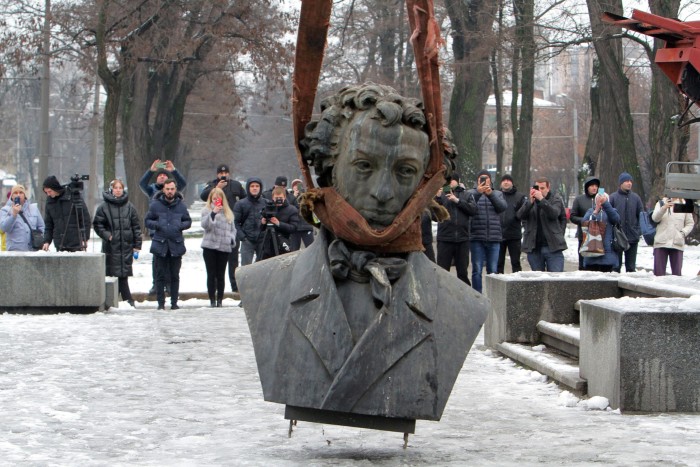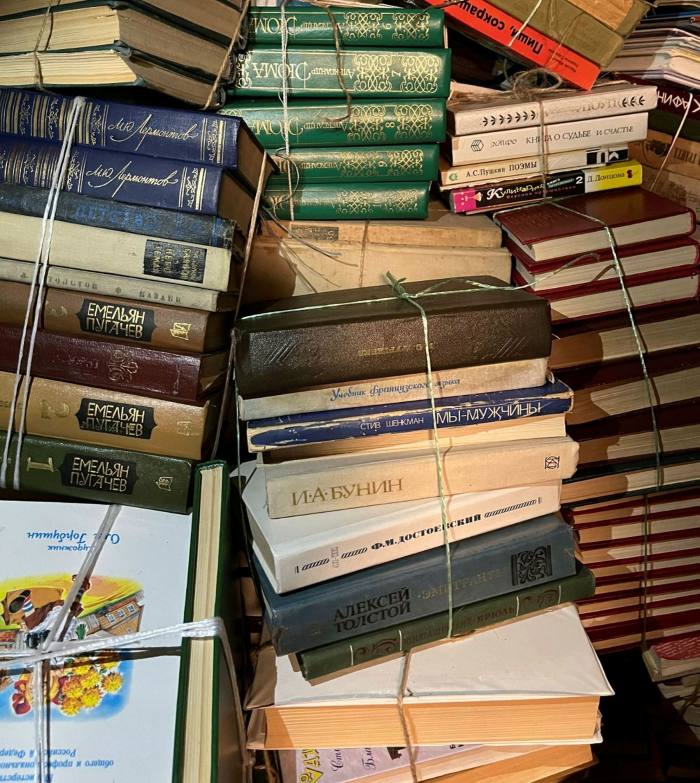Putin, Pushkin and the decline of the Russian empire posted at 23:07:37 UTC via ft.com
Putin, Pushkin and the decline of the Russian empire
Receive free Life & Arts updates
We’ll send you a myFT Daily Digest email rounding up the latest Life & Arts news every morning.
 A statue of Russian poet Alexander Pushkin being dismantled in the Ukrainian city of Dnipro in December 2022 © Mykola Myakshykov / UkrInform / Avalon
A statue of Russian poet Alexander Pushkin being dismantled in the Ukrainian city of Dnipro in December 2022 © Mykola Myakshykov / UkrInform / AvalonLast month, I stood at the corner of what used to be Pushkin Street in Kyiv. Following Vladimir Putin’s full-scale invasion of Ukraine in 2022, it has been renamed Yevhen Chykalenko Street, after a major figure of the early 20th-century Ukrainian independence movement. To lovers of literature and opera, cancelling Alexander Pushkin, poet and author of Eugene Onegin, might seem a bit over the top. Putin, yes, but why Pushkin?
For Ukrainians, however, engaged in an existential struggle for their independence against Russia’s war of recolonisation, Pushkin is a symbol of the Russian imperialism that has long denied Ukraine’s right to a separate national existence. Pushkin was a great poet, but also a poet of Russian imperialism, just as Rudyard Kipling was a great poet, but a poet of British imperialism.
Pushkin’s Poltava depicts the Ukrainian Cossack hetman Ivan Mazepa as a fickle traitor to the heroic Russian tsar Peter the Great, who nonetheless triumphed over the Swedes in the 1709 Battle of Poltava — and 12 years later formally founded the Russian empire.
As Russian forces bombarded Ukraine last year, an officially distributed video showed Russian foreign minister Sergei Lavrov reciting lines from Pushkin’s “To the Slanderers of Russia”, a poem fulminating against western supporters of Slavs rebelling against Russia. Cutaways to photos of US president Joe Biden and a G7 summit made the message plain. When Russian forces occupied Kherson, billboards featuring Pushkin were deployed in a propaganda campaign that proclaimed Russia was “here for ever”.
Gorbachev’s attempted reforms culminated in the most spectacular peaceful collapse of any empire in history
Small wonder some Ukrainians now refer on social media to “Pushkinists” launching missile attacks on their cities. For example: “Pushkinists didn’t allow us to sleep properly — it was very loud in Kyiv”. (After a couple of late night hours in an air-raid shelter, I didn’t feel all that friendly to Pushkinists myself.)
Behind this Ukrainian rejection of Pushkin is a much larger story. With hindsight, we can see that the decline of the Russian empire has been one of the great drivers of European history over the past 40 years. And with foresight, we should expect it to remain one of Europe’s greatest challenges for at least the next 20 years, if not another 40.
After the Russian Revolution of 1917, the Russian empire continued in a rather peculiar form as the Soviet Union. When the Union of Soviet Socialist Republics was founded in 1922, Lenin had decided it should be a state of notional equality between its constituent union republics. (Stalin, like Putin a hundred years later, wanted Ukraine to be part of the Russian Federation.) After the second world war, this novel version of empire dominated central and east European countries all the way to an Iron Curtain running through the middle of Germany. From Warsaw to Washington, people saw it as both a Soviet and a Russian empire.
 Bundles of books in Russian in the cellar of a Kyiv bookstore, waiting to be pulped © Timothy Garton Ash
Bundles of books in Russian in the cellar of a Kyiv bookstore, waiting to be pulped © Timothy Garton AshIn the 1970s, this imperial superpower still seemed to be a formidable rival to the US, even in parts of Africa and Latin America — but by the 1980s it was already in visible decline. Mikhail Gorbachev’s attempted reforms culminated, between 1989 and 1991, in the most spectacular peaceful collapse of any empire in history. This collapse dissolved not just Soviet/Russian control of central and eastern Europe, but also the much older imperial bonds between Russia, Ukraine and Belarus. Unusually, and precisely because of the complex relationship between Soviet and Russian, it was the leader of the core imperial nation, Russia’s Boris Yeltsin, who gave the final push.
Foolishly, many in the west assumed this was the end of the story, but declining empires don’t give up without a struggle. The first signs of a pushback were there already in 1992 in a Russian army occupation of what is still the breakaway territory of Transnistria, at the eastern end of the newly sovereign state of Moldova, as well as subsequently in two brutal wars to subdue Chechnya inside the Russian Federation.
Lavrov reportedly said that Putin has only three advisers: ‘Ivan the Terrible. Peter the Great. And Catherine the Great’
The empire then struck back decisively, across international frontiers, with the occupation of two large areas of Georgia in 2008, the annexation of Crimea and the beginning of the war in eastern Ukraine in 2014, and the full-scale invasion of Ukraine on February 24 2022. In his speeches and essays, the Russian leader makes it perfectly clear that his primary reference point is the Russian empire. Surprised by his boss’s decision last February, foreign minister Lavrov reportedly muttered to a friendly oligarch that Putin has only three advisers: “Ivan the Terrible. Peter the Great. And Catherine the Great.”
This history won’t be over even if Ukraine regains every square metre of its sovereign territory, including Crimea. There will still be Belarus, a country of more than 9mn people that at the beginning of this decade witnessed one of the most sustained efforts of civil resistance in modern history, against the increasingly autocratic rule of president Alexander Lukashenko. There are the independent post-Soviet states of Moldova, Georgia, Armenia and Azerbaijan, as well as those in Central Asia. Inside the Russian Federation, there are republics such as Chechnya, Dagestan and Tatarstan. At the moment, Chechen leader Ramzan Kadyrov is one of Putin’s most loyal henchmen, but if Russia enters a “time of troubles”, Kadyrov might begin to make other calculations.
We in the west should not kid ourselves that we can “manage” the decline of this nuclear-armed empire, any more than European powers could “manage” the decline of the Ottoman Empire in the late 19th and early 20th centuries. Western democracies have a chronic tendency to overestimate their ability to influence the domestic politics of authoritarian regimes. Our possibilities of direct influence are especially minimal in today’s Russia, a personalist dictatorship in an advanced state of paranoia and repression. After Putin, and perhaps his immediate successors, there should come a moment when we have more possibilities of constructive engagement, and we should prepare for that. But it will be a long time before Russia finally accepts that it has lost an empire and begins to find a role.
What we can and must do in the meantime is to ensure that those countries who seek a better future outside a declining Russian empire are able to do so in peace, security and freedom. Geopolitics, like nature, abhors a vacuum. In the long run, bringing Ukraine and its smaller neighbours into both the EU and Nato, thus securing them against any future attempt at recolonisation, will be a service also to Russia. With the door to empire finally closed, it can start the long walk to nation-statehood. That walk will, however, be especially difficult because, unlike old European states such as France and Portugal, which acquired and then lost overseas empires, Russia has no historically, geographically or constitutionally well-defined state to return to.
Recommended
Another post-imperial future was possible. Russian-language literature could have been enriched by the work of Ukrainian and other postcolonial writers, as English literature has been enriched by the work of South Asian, African and Caribbean writers. Trying to restore the “Russian world” by force, Putin has destroyed it. In May 2013, 80 per cent of Ukrainians said they had a positive general attitude to Russia. Last May, only 2 per cent of the Ukrainians that pollsters could still reach gave that answer. And Pushkin Street has been renamed. Putin has done for Pushkin.
Only when Ukraine is securely embraced by both the strong arms of the geopolitical west, the EU and Nato, will its people be able to sleep easily in their beds, as Estonians and Lithuanians do, untroubled by nightly attacks from “Pushkinists”. Then Ukrainians might even go back to reading Eugene Onegin with pleasure.
Timothy Garton Ash is the author, most recently, of ‘Homelands: A Personal History of Europe’
Find out about our latest stories first — follow @ftweekend
That’s according to the SBU chief, Vasyl Maliuk, who spoke in an interview with NV magazine, the SBU told Ukrinform.


Comments
Post a Comment